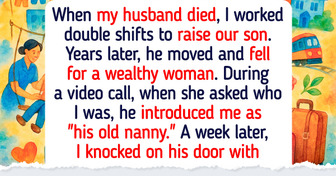HR is not your friend. Please don't learn this the hard way.
I Reported My Toxic Boss—And Realized HR’s Policy Is the Real Problem
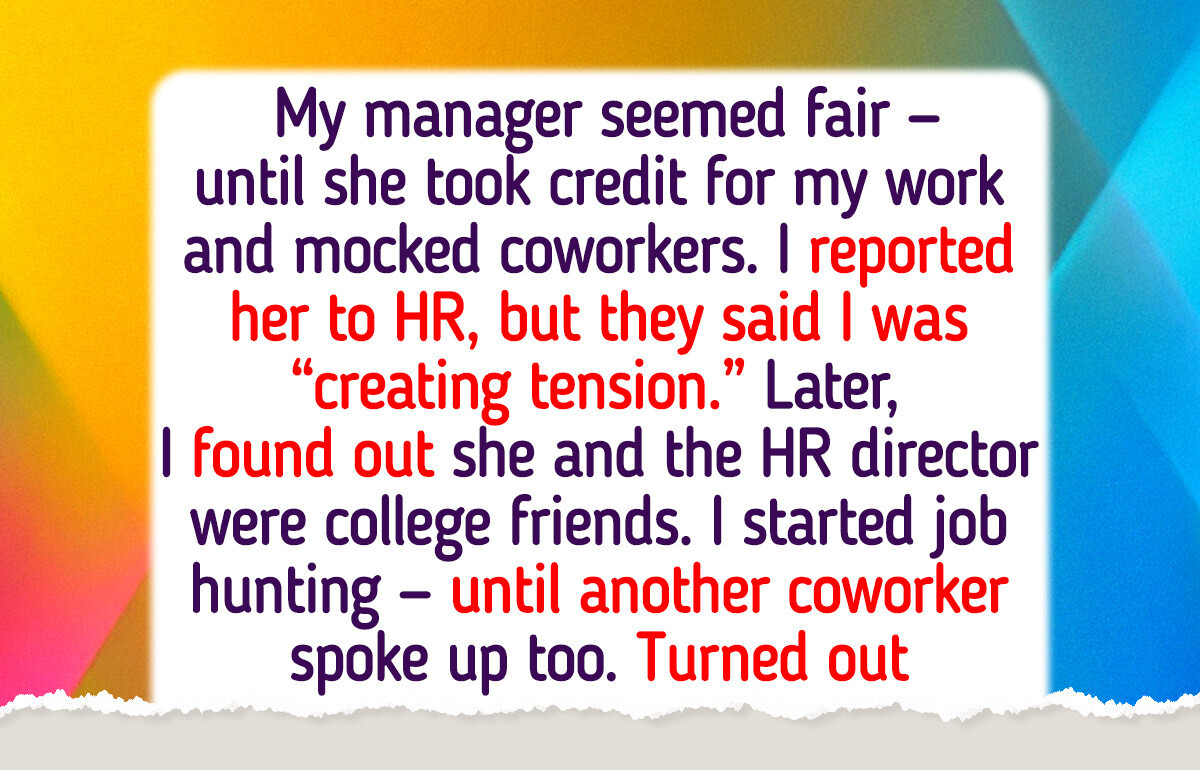
Standing up to a bad boss takes courage — especially when the system built to protect you ends up protecting them. This story from one of our readers reminds us how easily “speaking up” at work can turn into being labeled the problem.
The letter:
Hi Bright Side!
When I joined the company, my manager seemed strict but fair — until she started taking credit for my work, mocking coworkers in meetings, and messaging me after midnight. I finally reported her to HR, thinking I was doing the right thing.
Two days later, HR called me in “for a quick chat.” They said, “We’ve heard you’re creating tension on the team. Maybe you should take a break.” My complaint? “Under review.”
A week later, I learned my boss and the HR director were college friends.
I thought nothing would change and started searching for another job— until another coworker reported her too. Turns out, HR couldn’t ignore more complaints. They fired my boss, but HR never looked me in the eye again.
Emily

Ha! My former manager caused numerous transfers and at least 3 early retirements! My former manager was condescending, My department of 30 complained and H R. did nothing. I eventually went to corporate. That was 5 years ago and I'm not going anywhere!
Fuck them right is right
🙏 Thank You
Thank you for sharing your story with us. It’s not easy to challenge authority, especially in a workplace where power and loyalty often outweigh fairness. Your experience will help others find the strength to speak up when something isn’t right.
Why Toxic Managers Often Get Away With It.
Often, employees rarely quit jobs — they quit managers. Toxic leaders thrive in systems that reward results over respect, often because HR sees them as “too valuable to lose.”
Over time, this creates what’s known as institutional gaslighting: the victim (you) ends up doubting themselves while the controller keeps climbing. If you’ve been dismissed or labeled “difficult” after speaking up, know this — it’s a sign of a broken system, not a broken you.
A bad boss can do more than ruin your mood — they can ruin your health. Research shows that working under a toxic manager can increase the risk of heart disease by up to 60%. That’s not just stress — that’s your body sounding the alarm.
Why? Because toxic leadership creates constant pressure — unrealistic goals, zero support, favoritism, and intimidation. It’s the kind of environment where every meeting feels like a test and every email feels like a threat.
Bad bosses don’t just break morale — they break teams. When people live in fear of being “thrown under the bus,” creativity disappears, motivation fades, and workplaces turn into survival zones.
On the flip side, great managers can completely transform a workplace. One study found that 56% of employees would rather turn down a 10% raise than leave a great boss. Why? Because respect, trust, and fairness are worth more than money.
What to Do When HR Doesn’t Help You.

In addition to doing my full-time government job I also ran a federal labor union. Human resources is not there to protect employees. They are to prevent and mitigate legal damage to the organization. That doesn't mean they protect management. That means they protect the organization and if protecting the organization needs siding with the manager they will do so if it means siding with the organization against the manager they will do so and if you keep that in mind you will always come out ahead. In this example the manager was using favoritism and an unfair relationship to manipulate situations the organization is at risk from this and that is why the manager was dealt with typically if the organization is not at risk such things will be placed under review. In today's world economy and woke environment d e i places or one's place the organization at risk so many claims involving eeo violations most of which were false were taken seriously and over reacted to by HR. The pendulum is swinging thankfully because d e i does not actually achieve what it's theoretical games are but rather it is a new form of a quota system. you don't write the wrongs of the past by promoting women and minorities saying we have to increase representation unless they are 100% qualified for the position and if there's a tie experience wins out but that doesn't happen recently they have been promoting women and minorities in positions that they're not the best position to be in. A great example is in the bureau of Labor statistics in the cew branch. The negro branch chief who is now the division chief came into government 11 years ago after managing African theater in the DC area. She was promoted it's evident looking at her LinkedIn profile because she was black AKA and negro. Notice what's happened in the news too many women in minorities have been promoted in the bureau of Labor statistics because they were women in minorities. In the 1990s it was the glass ceiling and ironically I was beating out for a position by a woman who was promoted when I was at the top of the cert list with less qualifications than me because she was a woman. Ironically 7 years later she was being fired because she stopped showing up at the job and stop doing the job because she had too many quote personal issues quote going on which in reality where her begging for attention and in the meetings with management she didn't want to solve the position she wanted to complain about her ex-husband. This is typical of dei promotions in my experience in the federal government
Sometimes HR isn’t the safe space it’s supposed to be. Maybe you reported a toxic boss or workplace harassment — and instead of support, you got silence or subtle retaliation. You’re not alone. Many people discover the hard way that HR works for the company, not the employees.
So, what can you do when the people who should protect you... don’t?
1. Keep a Record — Always
Every email, every message, every meeting note. Save it, back it up, and print it. A solid paper trail is your best defense. It shows what really happened and protects you if things escalate.
💡 Pro tip: Keep copies on a personal device, not your work computer.
2. Make It Formal
If your first report gets ignored, don’t stop there. File a written, formal complaint. Include specific dates, actions, and evidence. It’s harder for HR to dismiss you when everything is in writing.
🗣️ You can write: “I’m following up on my previous concern submitted on [date]. Could you confirm next steps in the investigation?”
3. Go Higher — or Outside
If your HR rep isn’t responding, go to their supervisor. Stay professional and calm.
4. Seek Legal Advice
If things have gone too far, talk to an employment lawyer. Many offer free consultations and can tell you exactly what your rights are. They’ll also help you document your case properly — so you don’t feel helpless or alone.
5. Protect Your Peace
If you’ve done everything right and still get nowhere, it might be time to leave. Your health and self-respect are worth more than any paycheck. Sometimes the bravest move isn’t fighting the system — it’s walking away from it.
Maybe bad bosses come and go, but broken systems stay — until someone finally stops playing by their rules.
23 Kind Souls Who Proved the Softest Hearts Have the Strongest Beat
Comments
Related Reads
I Refused to Earn $25K Less Than a New Hire—So I Pulled a Move No One Saw Coming
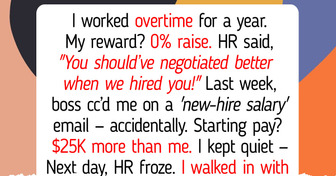
My Boss Saw Me on the Phone With My Sick Son—Now I’m on Thin Ice
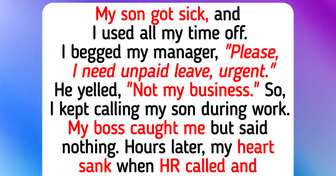
My Son Wants to Kick Me Out on the Street to Accommodate His New Family

15+ Unforgettable Gifts That Made an Everlasting Impression
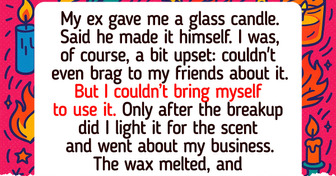
I Was Fired for an Intern — Karma Hit Fast
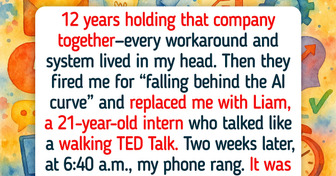
15 Moments of Kindness That Broke the Darkness Open
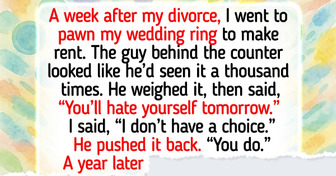
My Ex Put His New Family Over Our Son, So I Served Him the Sweetest Revenge
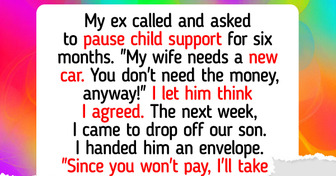
15 Stories That Prove Kindness Is Courage We Often Mistake for Weakness

I Told My Stepson to Pay Rent or Move Out, I Don’t Care If He’s Unemployed

10 Stories That Prove Kindness Always Wins

15 Stories That Show Kindness Can Change a Life in a Single Moment

My Son Was Ashamed to Introduce Me to His Rich Girlfriend, So I Made Sure He Learned Some Respect
